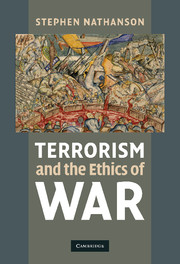Book contents
- Frontmatter
- Contents
- Acknowledgments
- Introduction
- PART I TERRORISM: WHAT'S IN A NAME?
- PART II WHY MORAL CONDEMNATIONS OF TERRORISM LACK CREDIBILITY
- PART III DEFENDING NONCOMBATANT IMMUNITY
- Introduction: the ethics of war-fighting: a spectrum of possible views
- 8 The realist challenge to the ethics of war
- 9 An ethic of war for reasonable realists
- 10 Walzer on noncombatant immunity as a human right
- 11 The supreme emergency exception
- 12 Rights theories, utilitarianism, and the killing of civilians
- 13 Immunity rights vs. the right of self-defense
- 14 A rule-utilitarian defense of noncombatant immunity
- 15 Why utilitarian criticisms of noncombatant immunity are mistaken
- 16 Is noncombatant immunity a “mere” convention?
- PART IV HOW MUCH IMMUNITY SHOULD NONCOMBATANTS HAVE?
- Conclusion: terrorism and the ethics of war
- Bibliography
- Index
16 - Is noncombatant immunity a “mere” convention?
Published online by Cambridge University Press: 05 June 2012
- Frontmatter
- Contents
- Acknowledgments
- Introduction
- PART I TERRORISM: WHAT'S IN A NAME?
- PART II WHY MORAL CONDEMNATIONS OF TERRORISM LACK CREDIBILITY
- PART III DEFENDING NONCOMBATANT IMMUNITY
- Introduction: the ethics of war-fighting: a spectrum of possible views
- 8 The realist challenge to the ethics of war
- 9 An ethic of war for reasonable realists
- 10 Walzer on noncombatant immunity as a human right
- 11 The supreme emergency exception
- 12 Rights theories, utilitarianism, and the killing of civilians
- 13 Immunity rights vs. the right of self-defense
- 14 A rule-utilitarian defense of noncombatant immunity
- 15 Why utilitarian criticisms of noncombatant immunity are mistaken
- 16 Is noncombatant immunity a “mere” convention?
- PART IV HOW MUCH IMMUNITY SHOULD NONCOMBATANTS HAVE?
- Conclusion: terrorism and the ethics of war
- Bibliography
- Index
Summary
The principle of noncombatant immunity is often regarded as a central moral truth. Tony Coady speaks of the “depth and centrality of the prohibition on intentionally killing the innocent” and says that it “functions in our moral thinking as a sort of touchstone of moral and intellectual health.” I want to preserve its moral centrality, but I have defended it as a derivative principle whose acceptance is connected to the role that it plays in diminishing the suffering caused by war. This particular defense is open to the charge that it reduces noncombatant immunity to a merely useful convention that at best provides weak protection for civilians.
Three aspects of my view invite this charge: my partial reliance on the status conception of innocence; my utilitarian defense of noncombatant immunity; and the resemblance between my defense of noncombatant immunity and a well-known, explicitly conventionalist defense of noncombatant immunity by George Mavrodes. In order to show that I have not reduced noncombatant immunity to a mere convention, I need to show 1) that the distinction between combatants and noncombatants is not purely conventional, 2) that rule utilitarianism is not a conventionalist theory, and 3) that my view differs from Mavrodes's conventionalist view of noncombatant immunity.
IS THE COMBATANT/NONCOMBATANT DISTINCTION MORALLY ARBITRARY?
Defenses of noncombatant immunity often begin by appealing to the idea that it is wrong to kill innocent people. They then infer that killing civilians is wrong.
- Type
- Chapter
- Information
- Terrorism and the Ethics of War , pp. 229 - 246Publisher: Cambridge University PressPrint publication year: 2010



